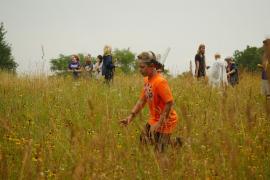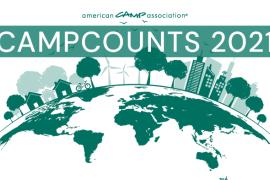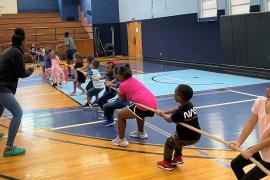Greetings camp evaluators! If you follow this blog, you’ll know that ACA’s fantastic Graduate Assistant Victoria Povilaitis has been writing the last several posts. You’ll hear from her again once she returns from winter break.
In the meantime, I am excited to be writing about evaluation once again. So excited that I literally laid awake in bed weighing the many different things I wanted to write about in this week’s blog.
With so much going in ACA research, I was having a hard time choosing just one thing to talk about. To give you just a snapshot:
- We just released a new video that we want you to share with your social media communities.
- We had a record number of submissions to present camp research at the upcoming Research Symposium. We will soon post the abstracts.
- Findings are emerging from Phase 1 of the Impact Study — and they have promising implications for camp as a context for lifelong learning.
- We received a record number of responses to our Business Operations survey, which means more robust financial data that will be available for download in January 2018.
- Another record for submissions was set this year for the Eleanor P. Eells Research in Practice Award — look for this announcement at the 2018 National Conference.
Instead of choosing just one of these topics, I decided to give them each some attention in our January and February blogs; in the meantime, I’m going to offer something that is in the spirit of the holiday season. Below I describe some of the best evaluation resources I’ve found and used this year. Some I’ve shared before, but they are worth keeping on the gift list, others are new.
- Evaluation for Leaders: Full disclaimer — I have not taken this course, but a colleague of mine has and said that it was easy to navigate, easy to understand, and relevant to camp evaluation. I’ve never seen a more comprehensive and free online course like this, so if you have the time and want to deepen your evaluation expertise, check this out.
- Striving for Rigor: I attended this short webinar last month and was impressed with how much I learned in less than 30 minutes. No matter where you are in terms of evaluation expertise, we should all work towards evaluating our programs and participants in way that is rigorous, so that we always protect the rights of the people we are evaluating and so our results are usable and trustworthy. This webinar is a great dive into the notion of rigor and how you can strive for rigor in your evaluation efforts.
- Create reports that people will actually read: The 1-3-25 Reporting Model is a great approach to sharing your evaluation results with your stakeholders. For your annual results, or results of a major evaluation project, this post describes strategies for creating a 25-page full report, a three-page executive summary, and a one-pager, that, together, provide multiple options for your readers.
- Use Excel to visualize data. This is another excellent resource from Stephanie Evergreen (blogger for #3 above). Here, she offers numerous tips for how to visualize your evaluation data using cool charts and graphs in Excel. I use this resource often, and those of you creating evaluation reports for your stakeholders should too.
- Last-minute presentation design. That title alone should have caught your eye — especially if you are, say, a human, and because of this human-ness you procrastinate creating your presentation slides. Check out this blog, as well as the many other easy to read and cartoon-centric evaluation tips and tricks.
- Include youth in your evaluation efforts. I’ve written about the benefits of engaging campers in your evaluation efforts before, and this article supports this notion and provides some practical tips about how to go about it.
- Advice from youth on how to engage youth in evaluation. This is a great set of tips written by youth evaluators for adult evaluators. My favorite: “Be a coffee filter. Rather than change the flow of thoughts, facilitate the refinement process toward a goal.” Engaging youth in evaluation is a promising approach to getting real, actionable evaluation information, and this resource is a great way to making the most of the opportunity to engage youth in in this way.
- Conduct better interviews: Interviewing campers, staff, parents, and other stakeholders to get information about your program is a powerful tool that often seems easier to pull off than surveys. Until you conduct your first set of interviews, that is. Interviews are hard to do well, but this short blog provides some easy tips for conducting interviews that get useful information.
- Choose the right charts to tell your evaluation story. Visualizing data — using visuals like charts and graphs to display data is perhaps the most critical step in the evaluation process. Unfortunately, data viz (as it is called) can be overwhelming, unless you have a degree in graphic design, and even then, it takes a solid understanding of statistics and data to do data viz right. This tool at least takes the mystery out of choosing the right chart.
- Evaluate social emotional learning, or at least evaluate your readiness to evaluate social emotional learning. Yes, that’s a thing. It’s called evaluation readiness, and it is a critical first step to ensuring that you have the capacity to evaluate SEL effectively and in a way to results in improved programs, staff training, and SEL outcomes among your campers. SEL is a big hot thing for camps, so let’s start by figuring out how to measure it at our camps.
- Take a break! This one’s just for fun, but also a reminder that evaluation should be playful and risky (not to your participants, of course). You might fall in the dirt, or you might need to take three, five, or eight passes at a single evaluation goal before you stick the landing. But keep at it, and try to have some fun.
- Last but not least . . . bookmark this link to stay in touch with ACA research. We have a lot of exciting findings and evaluation tips and tricks to share in the new year, so check back often.
Until then, keep up the important work you do for youth and families, and don’t forget to use ACA Connect to ask questions related to evaluation and learn from your camp community.
Laurie Browne, PhD, is the director of research at ACA. She specializes in ACA's Youth Outcomes Battery and supporting camps in their research and evaluation efforts. Prior to joining ACA, Laurie was an assistant professor in the Department of Recreation, Hospitality, and Parks Management at California State University-Chico. Laurie received her Ph.D. from the University of Utah, where she studied youth development and research methods.\
Photo courtesy of Camp John Marc in Dallas, Texas
Thanks to our research partner, Redwoods.
Additional thanks goes to our research supporter, Chaco.
The views and opinions expressed by contributors are their own and do not necessarily reflect the views of the American Camp Association or ACA employees.





